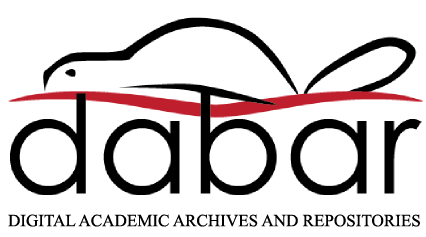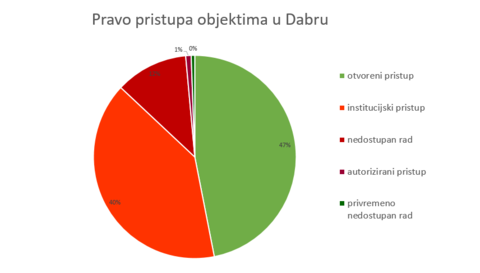At the annual conference SRCE e-Infrastructure Days - SRCE DEI 2021, as part of the thematic block “Information and data in science”, an award was given to repositories in DABAR for promoting open access. The winners of the award for promoting open access are the following repositories:
- Repository of the Faculty of Transport and Traffic Sciences, University of Zagreb
- Repository of the Faculty of Agrobiotechnical Sciences, University of Osijek
- Repository of the Faculty of Electrical Engineering, Computer Scinece and Information Technologies, University of Osijek
- Repository Juraj Dobrila University in Pula
- Polytechnic of Međimurje in Čakovec Repository
- Repository of the University of Rijeka, Faculty of Humanities and Social Sciences
- University of Zagreb School of Medicine Digital Repository
- Repository of the Institute of Economics, Zagreb
Openness in the DABAR system
In the Dabar system, 47% of objects are currently in open access, 40% in institutional access, 12% of works are closed, and about 1% of objects are available after the embargo has expired or only with authorized access.
The objects in open access with regard to the year of creation are in continuous growth. In 2016, there were 46% of objects in open access, in 2017 there were 47%, in 2018 there were 48%, in 2019 there were 47 %, in 2020 they were 51%, while in 2021 the open access increased to 61%.
In open access, graded works (43%), images (34%), audio-visual materials (14%) and graded artistic works (14%) are represented to a lesser extent. Slightly more than half of dissertations, contributions and book chapters (54-58%) are openly available. Educational contents (71%), books (78%), data sets and audio materials (88%) are in open access. More than 90% of papers in magazines, presentations, papers in proceedings, virtual collections and other types of documents are in open access.
Once again, we congratulate all repositories, their owners, editors, responsible persons, authors, students and leaders who encourage the publication of objects in open access through their work and activities.



